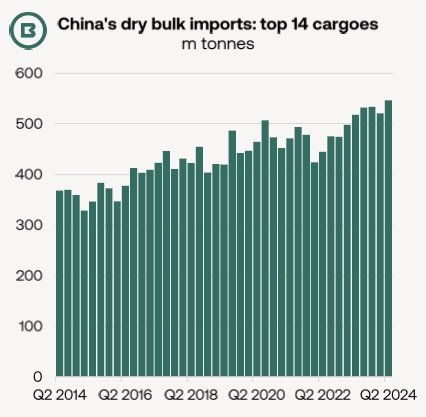All year long there has been a severe mismatch between the doom and gloom headlines surrounding the Chinese economy and the mountains of commodities shifting through the nation’s ports.
This dislocation is getting wider with the latest data from broker Braemar showing that in the second quarter China managed to break all records for dry bulk import volumes.
Using newly released customs data, Braemar has established that Q2 was the highest-ever quarter for imports into China of 14 dry bulk cargoes at 547m tonnes combined, overtaking the previous high in Q3 2023.
Braemar’s cargo survey includes iron ore, coal (excluding overland trade from Mongolia), bauxite, soybeans, a group of chrome, copper, manganese and nickel ores and concentrates, plus logs, wood pulp, petcoke, corn, wheat and steels. Bauxite showed the greatest percentage growth in Q2.
“Against a background of an ongoing real estate crisis, Q2 GDP growth slipping below the 2024 target and a surprise interest rate cut in a bid to stimulate economic activity, dry bulk imports reached new heights in the Q2, annualising close to 2.2 billion tonnes,” Braemar noted in a dry bulk update.
That’s not an economy that is suffering in the way that headlines and sentiment suggest
Official Q2 Chinese GDP growth statistics showed growth slowing from 5.3% in Q1 to 4.7% in Q2, something analysts at Clarksons Research suggested was an indicator of ongoing issues with consumer confidence and the property sector.
“Despite China not growing as fast as days gone by, the country’s GDP is still growing at more than 4%. However, high iron ore inventories remain a concern,” analysts at investment bank Stifel noted in a shipping earnings preview published yesterday, forecasting that there would be no significant seasonal rally for the back half of the year.
High iron ore inventories remain a concern
China’s top politicians met last week to thrash out long-term economic policies. The meeting of the Third Plenum, held roughly every five years, proved a likely disappointment for dry bulk owners with no stimulus plans.
Instead the conclave detailed plans to channel resources away from highly leveraged, unproductive sectors such as real estate to the industries of the future as well as prioritsing national security and common prosperity over short-term GDP growth.
China’s economic woes were also discussed at Geneva Dry earlier this year, the world’s premier commodities shipping event.
Saad Rahim, chief economist at Trafigura, argued that too many headlines had focused too strongly on China’s troubled property sector and that commodity import data showed there was more to the health of the People’s Republic than apartment sales. He pointed out China recorded record copper, aluminium, oil and gas demand last year.
“That’s not an economy that is suffering in the way that I think the headlines and sentiment suggest,” Rahim said, going on to point out that infrastructure spending and manufacturing remain “very, very strong”.


